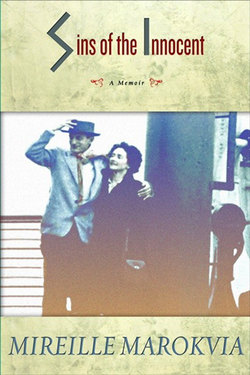Читать книгу Sins of the Innocent - Mireille Marokvia - Страница 17
На сайте Литреса книга снята с продажи.
XII
ОглавлениеMemories of these long-past days are like singed photographs retrieved from the ruins of a house that has burned down. Oddly estranged, they still make me shudder.
Abel and I, sitting on a bench in a darkening park, tears running down our faces. Passersby look down at us. Very un-German indeed, to weep in public. I still remember what I was seeing through my tears: flames devouring all things dear to me, from Chartres’s cathedral to my grandmother’s house with its thatched roof.
I, dwarfed and alone, walking under a hundred giant streamers—blood-red with black swastikas in a white circle—floating down Stuttgart’s tall stone buildings in celebration of a bloody victory over the hapless Poles.
Abel and I, standing under golden autumn trees, plotting how to get hold of younger brother’s gun. We needed a gun to end our own unbearable lives.
And then there was Abel’s white-haired mother saying that things are never as bad as one imagines. She must have known. No, she did not, we said.
Christine, eyes flashing, asking, “What did I tell you?”
Her calm husband, shaking his head, telling us, “The French are too smart to want to die for Poland.”
Maybe that was true. Days passed, and France and England, who had declared war, were not invading Germany as expected. One week passed, and Poland was crushed. One week! Russia lost no time in grabbing a large chunk of the vanquished country.
In the history book I had had in grade school, there was a picture I had not forgotten: Frederick the Great, king of Prussia, Catherine the Great, empress of Russia, and Maria-Theresa, archduchess of Austria, tearing apart a map of Poland.
This had happened in the eighteenth century. Was it Poland’s fate to be torn apart by its neighbors?
We were all awed by the swiftness of the German victory. But of course, Poland was such a backward country. The Poles had attacked the mighty German tanks on horseback, with lances!
On October 6, in a long speech, Hitler made a formal proposal for peace. Most Germans, I think, believed he was sincere. Abel and I, bewildered as we were, hung on to every shred of hope. We knew that the information we were fed was truncated, biased, or false, yet what one hears often enough, one begins to believe.
“Lies, lies, lies,” Christine said. “Some truths even are lies in disguise. French and English people don’t want war, Hitler says. Do people of any country ever want to have their lives disrupted, their homes destroyed, their sons killed? The Germans don’t want war either. Yet, we will get a big war. Hitler has tasted blood . . . he wants more of it.”
We refused to be as pessimistic as Christine. Winter had come. Nothing had happened. Nothing would happen. The world was listening to reason.
